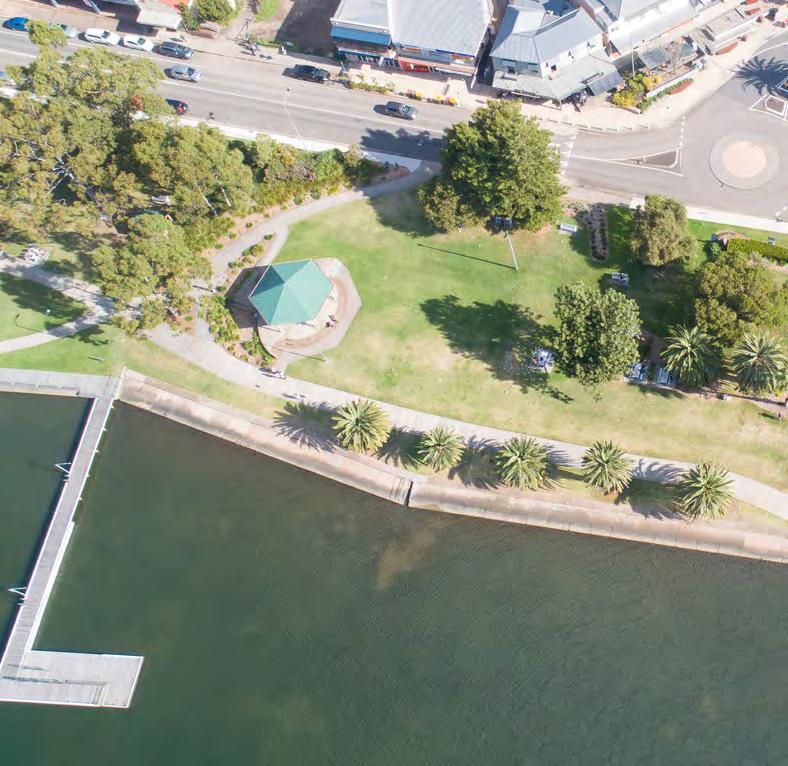
3 minute read
City governance
Lake Macquarie City Council exists as a body politic under the NSW Local Government Act 1993. We deliver our statutory roles, functions and objectives through a democratic and corporate governance structure.
DEMOCRATIC GOVERNANCE Community
The community elects the Mayor and Councillors.
Mayor and Councillors
The elected Council appoints the Chief Executive Officer.
CORPORATE GOVERNANCE Chief Executive Officer
The Chief Executive Officer appoints all other staff, including the Executive Team.
Executive Team
The Executive Team provides strategic and operational leadership within the organisation and ensures the organisational strategy is executed effectively and efficiently.
Senior Leadership Network and staff
The Senior Leadership Network (managers and key senior staff) and coordinators lead the day-to-day operations of Council.
ELECTED COUNCIL
Thirteen Councillors, including the Mayor, make up the decision-making body of Council. The city is divided into three wards: North, East and West. Each ward is represented by four Councillors. The Mayor is elected by popular vote, using an optional preferential method of voting.
CHIEF EXECUTIVE OFFICER
The CEO works closely with the elected Council in setting the longterm direction of the organisation, and is responsible for leading employees in implementing these plans. The CEO reports to the elected Council and is the only Council staff member to whom the Council can provide direct instructions.
EXECUTIVE TEAM
Led by the CEO, Council’s Executive Team comprises five senior staff members responsible for the following areas: • Planning for the Future • Built and Natural Assets • Service Delivery • Organisational Services • Development Planning and
Regulation.
INTERNAL OMBUDSMAN AND INTERNAL AUDITOR
Council is committed to good governance and the highest standard of ethical behaviour and accountability. The Internal Ombudsman combines an investigatory function with the capacity to identify improvement opportunities within Council’s governance framework. The Internal Ombudsman provides residents, community members, local businesses, staff, Councillors and other Council stakeholders with an ‘independent ear’ regarding complaints about administrative conduct, ethical behaviour, corrupt conduct, misconduct or maladministration. The Internal Auditor is responsible for auditing, monitoring and reviewing Council’s systems and control procedures and recommending action to improve systems and processes. Together, the Internal Ombudsman and Internal Auditor support Council to operate in an open, accountable and effective way.
COUNCIL ELECTIONS
Under the NSW Local Government Act 1993, council elections are held on the second Saturday in September every four years. Due to the COVID-19 pandemic, the NSW government has twice postponed council elections scheduled for 2020 for all NSW councils, until 4 December 2021.

ROLE OF THE MAYOR AND COUNCILLORS
The Mayor acts in the capacity of a Councillor, as well as Mayor of Lake Macquarie City. The Mayor presides at meetings of the Council and carries out the civic and ceremonial functions of the Mayoral office, such as hosting citizenship ceremonies. A Councillor represents residents and ratepayers, provides leadership and guidance to the community and facilitates communication between the community and the Council. Their role is to represent the Lake Macquarie community and make decisions in the best interest of the community and the environment.
COUNCIL MEETINGS
Council normally meets on the second and fourth Monday of each month from February to December each year. Meetings are open to the public, with the exception of confidential items, and are live streamed via Council’s website. The meetings are usually held in the Council Chamber at the Administrative Centre. Council meetings were held remotely from April 2020, but resumed in the Council Chamber in February 2021 with several measures implemented to ensure meetings occurred in a COVIDsafe manner. The further outbreak of COVID-19 in NSW required a return to remote Council meetings from June 2021.
STANDING COMMITTEE MEETINGS
Council has six Standing Committees that meet monthly to consider a broad range of matters. All Councillors are members of these Standing Committees. The Standing Committees include: • Organisational Services Standing Committee • Development and Planning Standing Committee • Service Delivery Standing Committee • Planning for the Future Standing Committee • Built and Natural Assets Standing Committee • General Business Standing Committee.
AUDIT, RISK AND IMPROVEMENT
Council has an established Audit, Risk and Improvement Committee to support good governance within the organisation. The focus of the Committee is to assist Council to improve its performance and ensure effective internal control of Council’s finance, risk, work health and safety and performance improvement activities. The Committee serves as an independent and objective party to assist the CEO and the elected Council in determining whether the organisation complies with relevant laws and standards, including policy directions of the Office of Local Government in relation to audit, risk and improvement standards.










